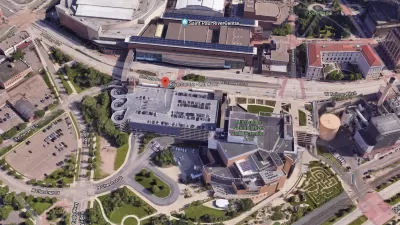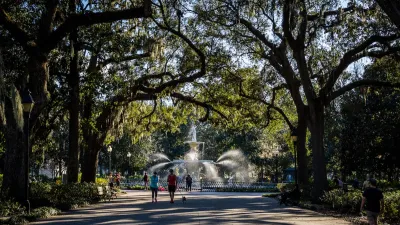A recent article laments the missed opportunity of President Obama’s recent calls for increased spending on infrastructure: a lack of acknowledgement that cities are the best places to spend those dollars.
Starting from the assumption that “[public] investment in infrastructure and human or social capital combine to provide a societal foundation for dynamic economic growth and development by connecting the various economic sectors and industries,” a recent article by Michael A. Pagano makes the case for focusing infrastructure spending in the nation’s cities to achieve maximum economic benefit.
“Why is it so difficult… to knit together a transformative economic strategy that is explicitly rooted in and mediated by a metropolitan- or urban-focused set of policies?”
That difficulty is particularly troubling to Pagano given the high costs of deferred maintenance of the existing urban infrastructure. (The tendency of the federal government to favor infrastructure investments in suburban and rural settings has been discussed before.)
Instead of expanding infrastructure investments farther and farther out into the sprawl, Pagano suggests an alternative: “If new or expanded infrastructure projects are required, there must be an economic demand for those economic activities, and the political entities that gain from them should pay the lion's share of their costs.”
FULL STORY: Why We Should Focus Infrastructure Spending on Urban America

Alabama: Trump Terminates Settlements for Black Communities Harmed By Raw Sewage
Trump deemed the landmark civil rights agreement “illegal DEI and environmental justice policy.”

Planetizen Federal Action Tracker
A weekly monitor of how Trump’s orders and actions are impacting planners and planning in America.

The 120 Year Old Tiny Home Villages That Sheltered San Francisco’s Earthquake Refugees
More than a century ago, San Francisco mobilized to house thousands of residents displaced by the 1906 earthquake. Could their strategy offer a model for the present?

In Both Crashes and Crime, Public Transportation is Far Safer than Driving
Contrary to popular assumptions, public transportation has far lower crash and crime rates than automobile travel. For safer communities, improve and encourage transit travel.

Report: Zoning Reforms Should Complement Nashville’s Ambitious Transit Plan
Without reform, restrictive zoning codes will limit the impact of the city’s planned transit expansion and could exclude some of the residents who depend on transit the most.

Judge Orders Release of Frozen IRA, IIJA Funding
The decision is a victory for environmental groups who charged that freezing funds for critical infrastructure and disaster response programs caused “real and irreparable harm” to communities.
Urban Design for Planners 1: Software Tools
This six-course series explores essential urban design concepts using open source software and equips planners with the tools they need to participate fully in the urban design process.
Planning for Universal Design
Learn the tools for implementing Universal Design in planning regulations.
Clanton & Associates, Inc.
Jessamine County Fiscal Court
Institute for Housing and Urban Development Studies (IHS)
City of Grandview
Harvard GSD Executive Education
Toledo-Lucas County Plan Commissions
Salt Lake City
NYU Wagner Graduate School of Public Service





























